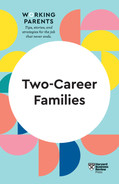How to Not Fight with Your Spouse When You Get Home from Work
by Ed Batista
Quick Takes
- Realize that you and your partner may have different needs at the end of the day
- Expect that everyone will need some time to unwind
- Think about what “coming home” means for your spouse
- Consider the time it takes you and your partner to recover from challenges
- Talk about what you’d like to see happen when you first get home
My coaching clients have hard jobs with big responsibilities that generate lots of stress, and many of their spouses and partners have similarly demanding careers. And yet one of the most challenging experiences in their day doesn’t occur at work, but in the first 15 minutes after they arrive home and greet each other.
When that initial personal encounter at the end of the workday goes well, it can help both parties feel a sense of care and appreciation that helps them unwind and feel better prepared for the following day. And yet it so often goes badly, creating frustration and a sense of disappointment that can poison the rest of the evening. There are several factors that make this such a difficult situation for couples to navigate.
Why We Can Clash
Different needs
Both parties are likely to be in different mental and emotional states with differing sets of personal needs, and while this may seem self-evident, it’s striking how many couples forget this when they walk in the door. A common version of this is someone arriving home after a difficult day who needs some quiet and solitude before being ready to engage, only to meet a spouse or partner who arrived home earlier (or who spent the day there) and is eager to connect.
Even if both people arrive home simultaneously, they may have had vastly different experiences during the day—one person ran into a string of conflicts and had a terrible commute, while the other went from one triumph to another and enjoyed a peaceful journey home.
And even if both people had similar days, they may simply need very different things in response to those experiences. Some people need to talk about their workday with a supportive listener, while others need time for quiet reflection. Some people need entertainment, some need distraction, some need a drink, and some just need a hug.
Different recovery times
Richard Davidson, a neuroscientist at the University of Wisconsin, has spent decades studying the relationship between our emotions and various brain structures and neurological systems. In his book The Emotional Life of Your Brain, Davidson notes that people vary widely with regard to the speed with which we recover from adverse experiences. (Davidson calls this quality “resilience,” but I prefer “recovery time,” as I use the former term more broadly when discussing our overall response to stress and challenges.) Davidson’s research demonstrates that people with different recovery times even show different patterns of activity in their brains.
In practice, this means that someone who had an objectively horrible day at work may be in a good mood by the time they step out of the office, yet someone who encountered fewer challenges may still feel their impact well into the evening.
Different cultures
“Every relationship is a cross-cultural experience,” according to John Gottman, an eminent psychologist at the University of Washington whose research has focused on marriage and committed relationships. In Principia Amoris: The New Science of Love, Gottman writes, even “if we come from the same country, the same part of the country, the same race, and the same religion, we come from . . . families that have defined meaning in very different ways. When we build a relationship together, we must decide on our own meanings.”
But while couples may take the time to understand and evaluate their respective life goals and philosophies before embarking on a shared existence together, they rarely stop to think about the more mundane aspects of domestic life and what it means to build a cross-cultural relationship in those domains.
That’s why spouses and partners may have significantly different interpretations and expectations about what it means to “come home” and how people are expected to interact on such an occasion.
How to Have a More Peaceful Reunion
So what can we do to fight less when we get home?
Recognize your differences
It’s unrealistic and unhelpful for couples to expect that they’ll automatically be in sync when they arrive home. Different needs, different recovery times, and different cultures all combine to make it more likely rather than not that couples will be out of sync when they first encounter each other at the end of the workday.
Identify your needs as individuals
Make time to talk as a couple about how your family comes together at the end of the day. Don’t have this conversation when you first walk in the door—set some time aside when you and your partner are at your best. This may seem like a trivial issue to take so seriously, yet a consistent failure to recognize the importance of this encounter is precisely why so many couples find it so stressful. A little planning—and some candor about what you, your partner, and your kids need—goes a long way.
Regulate yourself
Practicing some degree of emotion management and self-monitoring can be particularly useful. We tend to approach our spouses and partners with the expectation that we can just be ourselves, without worrying about how we’ll be perceived or our impact on them. And yet a consequence of this approach is that we take all the interpersonal skills that we work so hard to apply as leaders and managers, and we throw them out the window as we get close to home, just when they’d be most useful.
Adapted from content posted on hbr.org, April 12, 2016 (product #H02T76).
